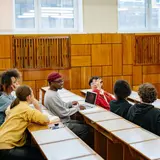Empowering Students to Navigate the Digital Age: A Call to Action for Educators

Counselor (and writer) Michael Creekmore discusses the increasing prevalence of digital drama among students, and the negative impact that it has on their emotional well-being, in “Helping Students Navigate Digital Drama,” for Educational Leadership. In particular, Creekmore stresses the need for educators to help students in developing digital problem-solving skills to navigate online conflicts effectively.
Creekmore suggests several strategies. Teachers can, for instance, share personal experiences in order to help students understand multiple points of view and develop empathy. It’s also important for teachers to stay updated on online slang and trends, so that they can better understand the nuances of student interactions. Teaching students about social media etiquette and de-escalation techniques will better equip them to handle online conflicts, along with providing them with practical strategies to resolve conflicts.
By implementing such strategies, teachers have a better chance of empowering students to become responsible digital citizens.
“Digital drama” can significantly impact students' mental health, academic performance, and social relationships. When students are involved in online conflicts or cyberbullying, they may experience anxiety, depression, and difficulty concentrating in school. And these conflicts can damage friendships in the long term, creating a hostile learning environment for everyone involved. Teachers are in a unique position to help students develop the skills needed to navigate the digital world responsibly and maintain positive relationships, both online and in the classroom.
Do students have the social skills to diffuse their own conflicts? Do these skills differ between the real world and their online ecosystem?